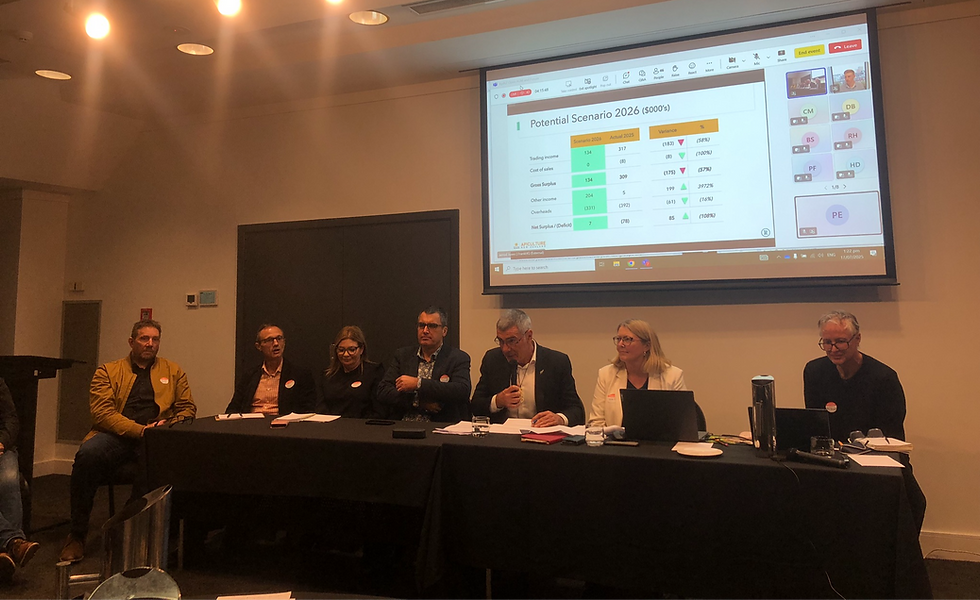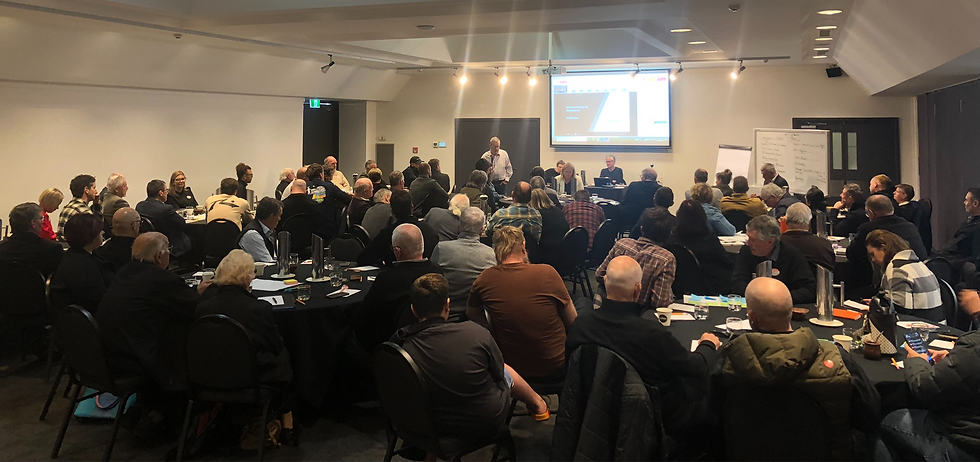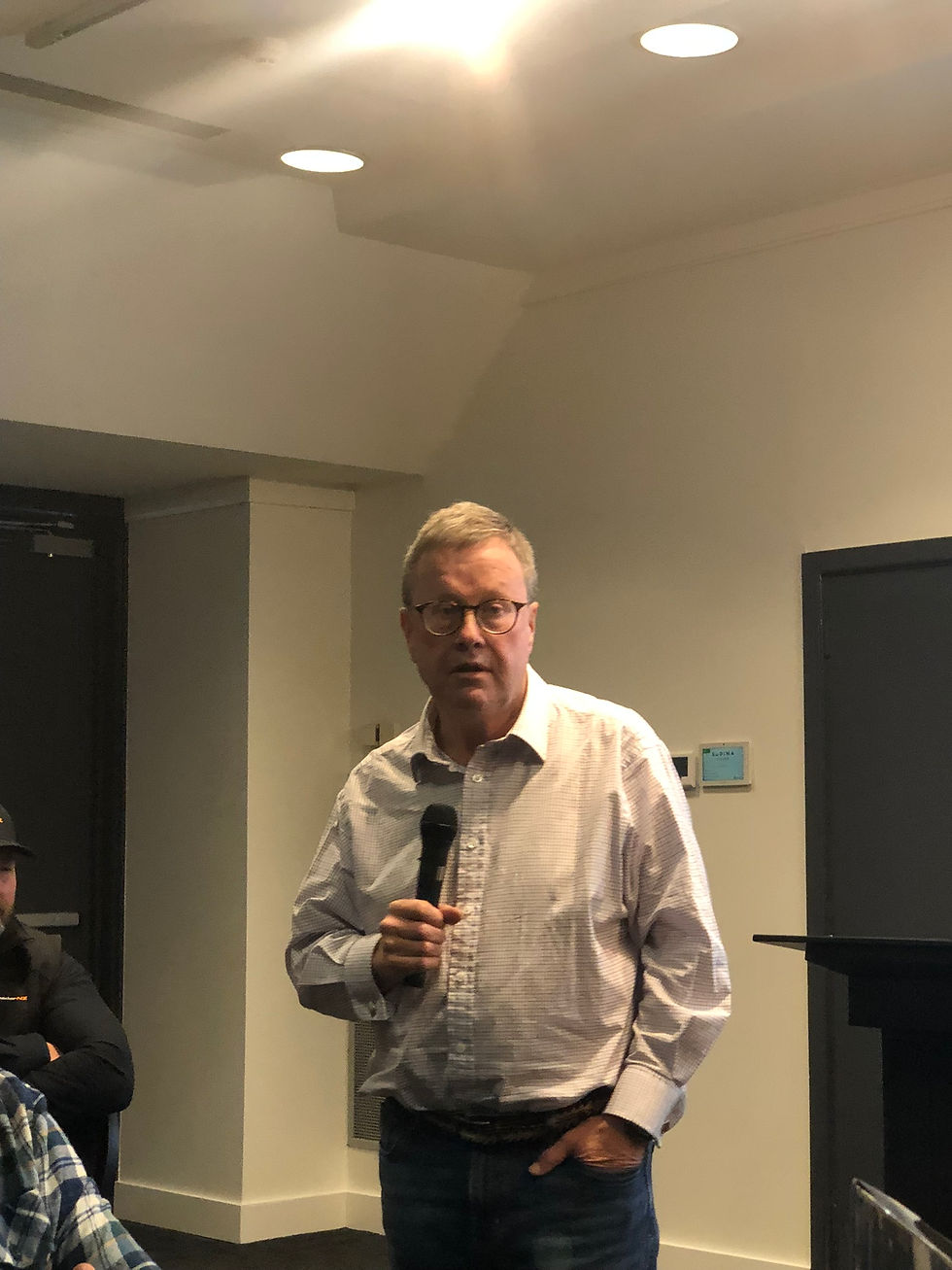ApiNZ Survives Amidst Hopes for a New Model of “Trust and Confidence”
- Patrick Dawkins

- Aug 1, 2025
- 9 min read
Updated: Aug 4, 2025
In a day of competing ideas and ideals as to the future of beekeeping industry representation, Apiculture New Zealand’s (ApiNZ) members voted to keep their industry-good body alive at their AGM on July 17 in Christchurch. The decision to defeat a resolution to dissolve was bookended by open-format discussions among an in-person and online audience of a little over 100, conversations which will now act as the first step on a new journey of consultation with beekeepers on how best to represent their interests.
Despite some straight talking and differences of opinions at times, a mood for collaboration and the agreed need for “trust and confidence” in any industry body emerged from the Sudima Hotel conference room. A more detailed definition of that industry body will occupy ApiNZ staff and governance board in the coming months, as they look to meet with various beekeeping groups around the country.

“We have achieved a lot,” ApiNZ chair Nathan Guy concluded at the end of around six hours of back and forward between participants, which touched on the purpose, value and structure of an ideal industry good group, plus how to fund it.
Attending, both in person and online, were both members of ApiNZ as well as non-affiliated beekeepers and stakeholders from around the industry. Among those included was Ian Fletcher, advisor to fellow beekeeping group New Zealand Beekeeping Incorporated (NZBI). He reported on consultation already undertaken with industry in a ‘roundtable’ process he has facilitated since April. Ahead of the event NZBI had thrown the inclusion of their expert advisor in doubt by proposing several conditions around his attendance. To what level of agreement was reached between the groups on those matters was not defined in Christchurch, but Guy and Fletcher proved together they could facilitate highly constructive conversations on the topic of a more unified future for apiculture, thus taking an important first step towards that goal.
Living to Fight Another Day
The process to get to the all-important vote on ApiNZ’s survival was stuttered, in part due to the challenges of a mixed in-person and online attendance, and in another part due to a last minute change to the wording of the key resolution and with it some renewed debate on the future of the group. Ultimately, when all the votes were counted though, the chair announced “an emphatic endorsement for Apiculture New Zealand to continue” as 82% of the weighted vote defeated the resolution to dissolve. That resolution had been tabled since a March SGM where members elected to give the organisation more time to come up with a survival plan.
Life support is now available in the way of a $150,000 grant from the Honey Industry Trust, announced earlier in July. It’s availability, which will provide for key staff to maintain their roles and conduct further consultation with beekeepers on the best structure to move forward with over the next six months, seemingly made the members’ decision to keep ApiNZ alive an easy one despite finances dwindling.
ApiNZ has been in existence since 2016, formed from a merger of the National Beekeepers Association (NBA), which had operated since 1914, and Federated Farmers Bee Industry Group. For a period ahead of the crucial vote in Christchurch the AGM resembled boisterous meetings of the former NBA, after life member of that group – and therefore now ApiNZ – Russell Berry first called for a vote on an adaptation to the wording of the key resolution. While taking the floor on that matter, the NZBI founding and executive member, who has long been at odds with aspects of ApiNZ’s operations, implored the voting members to indeed call time on the organisation.
“I’m not saying you haven’t done a great job, but the lack of membership is a real problem. We are talking about getting people together and new membership, so let’s start again and get on with it,” Berry stated.
“I think it is very important to bring everybody together and start afresh … ApiNZ is in a serious financial position, they have spent a lot of beekeepers’ money over the years and I don’t believe we should be carrying on the same path, wasting a lot of your money running this beekeeping organisation like it is.”
While Berry’s motion to breviate the resolution to dissolve was seconded by NZBI president Jane Lorimer and carried by the ApiNZ membership, his forthright manner and clear message in support of dissolution left many in attendance frustrated. It followed on from a morning where Guy and Fletcher had shared the microphone and Lorimer had begun the AGM by voicing a desire to “jointly work together to create a sustainable future for all of us”. Berry’s approach seemingly dented that cohesion, but not the ApiNZ memberships’ desire to maintain their group.
An Organisation to Organise All
While the “trust and confidence” theme emerged early in the day’s talks, even earlier the ApiNZ chair set the table for discussions by stating the need for change.
“Right now I don’t think things can get any worse for us,” Guy said.
“We need to think about the future and how we can find a sustainable funding model. Politics have got in the way too often in this industry. We need to come together. I believe today is a start.
“This is not about Apiculture New Zealand and its future, it is indeed about your industry’s future. It needs a new way of thinking. Revitalised leadership … we need to encourage younger people into our industry to bring new ideas and revitalise the industry from the ground up.”
Following a wide discussion on the purpose of any industry group which should emerge, vastly experienced beekeeper and industry advocate Allen McCaw encapsulated his position on the matter stating “the purpose of an organisation is to organise”.
“To make that happen, we have to be in a position where we can get a fair representation of all view-points, accepting dissension, into a body that can organise. There is a heck of a lot to be done. Don’t have any doubts about that.”

Retired Marlborough beekeeper Murray Bush backed up that sentiment, looking to a white board which included purposes such as ‘biosecurity’, ‘bee health’ and ‘data collection’ and pointed out “every year there is a different set of issues”.
“Therefore, organisation is priority one, two, three and four,” Bush reinforced.
Gold Nuggets
The afternoon session, post AGM, saw various ‘gold nugget’ ideas presented both in person and online in five-minute speaking slots. A wide gamut of concepts and philosophies emerged, from promoting the value in the current ApiNZ constitution, to calls for a complete refresh of leadership positions, and new governance structures besides.
General agreement was reached on a concept, put into one word by not a beekeeper or honey marketer but scientist Linda Newstrom-Lloyd. She called for a structure which would utilise the best parts of ApiNZ’s constitution and the best of the former NBA model, based in “subsidiarity”.
The term refers to organisational structures which allow for decisions to be made at the lowest possible level. The concept of allowing for more lower-level control in the industry had been voiced earlier in the day, albeit without the succinct “subsidiarity” term being used, when Guy spoke to unity driving effective organisation. “You need to go from here,” he said, holding his hand low, “to up here,” as he raised his arm. Fletcher’s views were united on that too as he summarised towards the conclusion of the days’ discussions – “uniting comes from upwards, not downwards”.
Money Talks
Also towards the backend of the day was a short down-to-business discussion on where funding for any group might come from.
ApiNZ CEO Karin Kos set the table with a clear and present example of what a lack of funding looks like, by apologising for technical difficulties which resulted in poor sound quality for some viewing online and even in person. That reached its worst when the chair of the AGM was required to paraphrase, to those in the room, the barely audible accountant’s report from the computer video call – information critical to the impending decision to survive or dissolve a group due largely to its financial position.
“I am sorry about the audio for online, but we are on a really tight budget. Normally at an industry conference we would have technicians on board and it would be fabulous. I want that fabulous experience for our industry,” Kos explained.
Once again, opinions varied on where funding might come from, with the often-cited need for a compulsory levy again raised. Both Guy and Fletcher brought the industry back to the reality of the present state when considering a levy in their closing statements though. Fletcher cut straight to the point.

“The discussion about funding has the danger of ending up in fantasy funding,” he said.
“You have got to think about what you have the power to do now. What they say about bankruptcy is, ‘it happens slowly, then it happens quickly’… A levy of any sort, under any framework is a couple of years away. If you don’t have a way to bridge that, it is a delusion. It needs to be realistic to start with.”
Guy, a former Minister for Primary Industries, who now occupies the chair role of both ApiNZ as finances dwindle as well as that position with the Meat Industry Association, weighed in on the levy topic too.
“Speaking from experience, Ministers always look about and ask ‘how united is the industry? Am I going to get a whole lot of political noise during the consultation round, or is this going to be plain sailing and let’s get on and do it’ … Ian’s comment is completely right. We are into a voluntary model, until we can hold hands and unite, with the Honey Industry Trust support, to get to a point where we can prove to the Government we are worthy of a commodity levy,” Guy said.
Hand Holding
That process of ‘holding hands’ among leadership of several industry groups, most notably ApiNZ and NZBI, has been a problem for almost as long as ApiNZ emerged from the NBA-Federated Farmers merger. The events of July 17 prove leadership have some understanding of what must be done to attract more followers, but it also proved that some old beliefs will die hard, and potentially not at all.
Bush, who has been involved in both NZBI’s roundtable process and was present in Christchurch, stated he believed it is wrong to determine the roundtable meetings – which also extended invites far and wide – as “an NZBI process, and this one an ApiNZ process”.
“We need to get the two groups working together. If they are not, what is the point?” Bush asked the gathering, or perhaps more likely those at the top tables.
“It needs to be unbranded,” Fletcher added, with that stipulation already having been one of NZBI’s requirements of his participation.
“The purpose of a church is for the non-members … there needs to be a place for everyone. If it is a winners and losers story, there are only losers.”

While ApiNZ possesses expertise on staff and at a board level to potentially run a successful consultation process to best utilise the money put on offer by the HIT, it would clearly be significantly aided by incorporating Fletcher’s own vast expertise. The former bureaucrat has held top roles in trade, biosecurity and security across several continents, has an academic background centred in constitutional history and proved himself a person of significant potential value to an industry seeking to form a meaningful and lasting constitution.
“It sems to me everyone wants a single framework to represent the industry in some way. In ApiNZ and NZBI there are two industry bodies with a range of support, yet if there is to be a single one there needs to be a single process going forward. That should be the mandate,” Fletcher concluded.
Despite the odd bump during the first day travelled on the road paved by the HIT’s funding, emanating from the words spoken is a clear desire for a shared journey over the next few months.
“We had a little scuffle through the AGM, but I have moved on from that,” Guy concluded the busy day of AGM and discussion.
“Because the industry is bigger than that. It is bigger than politics, bigger than ‘them’ and ‘us'. It is about we and all of us coming together.”














Comments